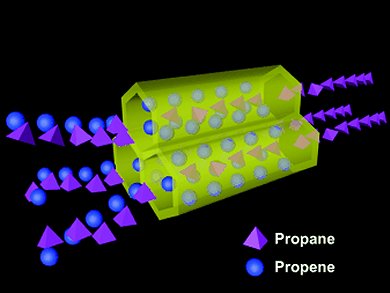For the industrial production of propene, an important commercial petrochemical, it first must be separated from the chemically very similar propane. This process is exceedingly costly and energy-intensive when done by standard cryogenic distillation methods. Metal-organic frameworks (MOFs) offer a much more cost- and energy-efficient alternative to distillation by means of adsorptive separation, and have shown promising results for use in propene/propane separation over the past few years.
Scientists at Northwestern University, Evanston, Illinois, USA, and Dow Chemical Company, Midland, Michigan, USA, reported a series of isostructural frameworks M-MOF-74 (M=Co, Mn, Mg) that contain high concentrations of open metal sites. These frameworks were reported to exhibit high adsorption selectivities for propene over propane. A combination of experimental methods and simulations revealed Co-MOF-74 to exhibit the highest thermodynamic propene/propane selectivity (ca. 46) ever reported for MOFs to date.
The selectivity can be explained by the strong π-complexation between the open Co2+ sites and the propene molecules. The most striking part of this discovery is that the high selectivity occurs at ambient temperature and pressure and thus lends itself to direct industrial application. The pore sizes in the Co-MOF-74 system are optimal for the size of propene molecules, thus making large pressures unnecessary to achieve the ultra-high separation selectivity.
Image: © Wiley-VCH
- High Propene/Propane Selectivity in Isostructural Metal–Organic Frameworks with High Densities of Open Metal Sites,
Y.-S. Bae, C. Y. Lee, K. C. Kim, O. K. Farha, P. Nickias, J. T. Hupp*, S. T. Nguyen*, R. Q. Snurr*
Angew. Chem. Int. Ed. 2012, 51, 1857–1860.
DOI: 10.1002/anie.201107534
The selectivity record reported in this article can be found in the growing list of world records in chemistry that is published in The Chemical Record and featured on ChemistryViews, under the category “Frameworks, Clusters, and Magnets”.




